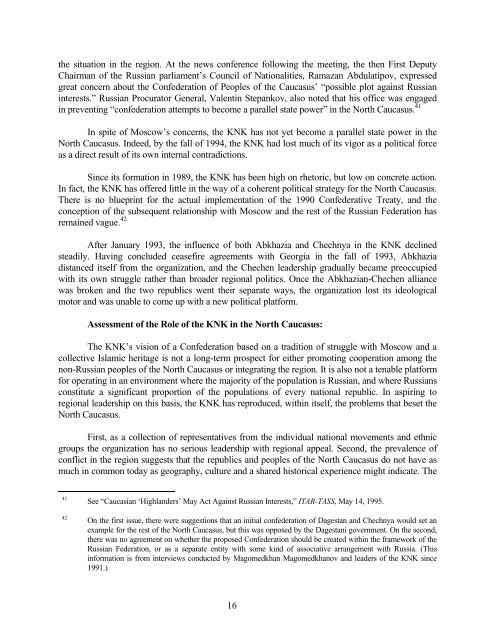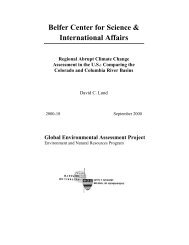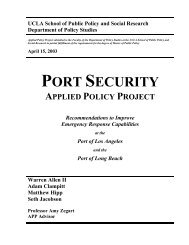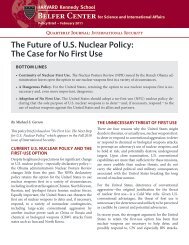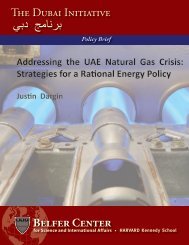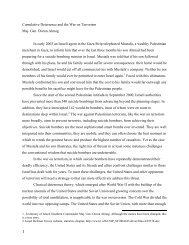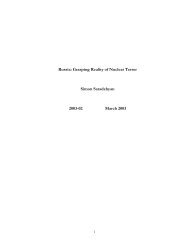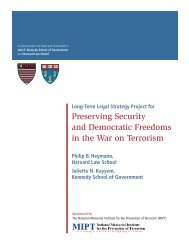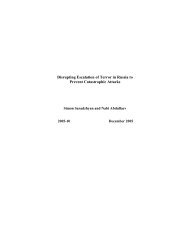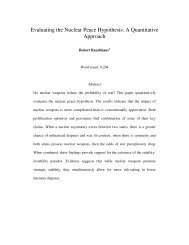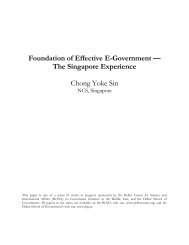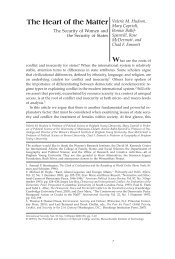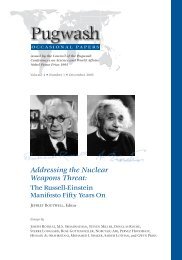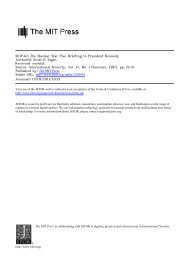RUSSIA'S TINDERBOX - Belfer Center for Science and International ...
RUSSIA'S TINDERBOX - Belfer Center for Science and International ...
RUSSIA'S TINDERBOX - Belfer Center for Science and International ...
Create successful ePaper yourself
Turn your PDF publications into a flip-book with our unique Google optimized e-Paper software.
the situation in the region. At the news conference following the meeting, the then First Deputy<br />
Chairman of the Russian parliament’s Council of Nationalities, Ramazan Abdulatipov, expressed<br />
great concern about the Confederation of Peoples of the Caucasus’ “possible plot against Russian<br />
interests.” Russian Procurator General, Valentin Stepankov, also noted that his office was engaged<br />
in preventing “confederation attempts to become a parallel state power” in the North Caucasus. 41<br />
In spite of Moscow’s concerns, the KNK has not yet become a parallel state power in the<br />
North Caucasus. Indeed, by the fall of 1994, the KNK had lost much of its vigor as a political <strong>for</strong>ce<br />
as a direct result of its own internal contradictions.<br />
Since its <strong>for</strong>mation in 1989, the KNK has been high on rhetoric, but low on concrete action.<br />
In fact, the KNK has offered little in the way of a coherent political strategy <strong>for</strong> the North Caucasus.<br />
There is no blueprint <strong>for</strong> the actual implementation of the 1990 Confederative Treaty, <strong>and</strong> the<br />
conception of the subsequent relationship with Moscow <strong>and</strong> the rest of the Russian Federation has<br />
remained vague. 42<br />
After January 1993, the influence of both Abkhazia <strong>and</strong> Chechnya in the KNK declined<br />
steadily. Having concluded ceasefire agreements with Georgia in the fall of 1993, Abkhazia<br />
distanced itself from the organization, <strong>and</strong> the Chechen leadership gradually became preoccupied<br />
with its own struggle rather than broader regional politics. Once the Abkhazian-Chechen alliance<br />
was broken <strong>and</strong> the two republics went their separate ways, the organization lost its ideological<br />
motor <strong>and</strong> was unable to come up with a new political plat<strong>for</strong>m.<br />
Assessment of the Role of the KNK in the North Caucasus:<br />
The KNK’s vision of a Confederation based on a tradition of struggle with Moscow <strong>and</strong> a<br />
collective Islamic heritage is not a long-term prospect <strong>for</strong> either promoting cooperation among the<br />
non-Russian peoples of the North Caucasus or integrating the region. It is also not a tenable plat<strong>for</strong>m<br />
<strong>for</strong> operating in an environment where the majority of the population is Russian, <strong>and</strong> where Russians<br />
constitute a significant proportion of the populations of every national republic. In aspiring to<br />
regional leadership on this basis, the KNK has reproduced, within itself, the problems that beset the<br />
North Caucasus.<br />
First, as a collection of representatives from the individual national movements <strong>and</strong> ethnic<br />
groups the organization has no serious leadership with regional appeal. Second, the prevalence of<br />
conflict in the region suggests that the republics <strong>and</strong> peoples of the North Caucasus do not have as<br />
much in common today as geography, culture <strong>and</strong> a shared historical experience might indicate. The<br />
41 See “Caucasian ‘Highl<strong>and</strong>ers’ May Act Against Russian Interests,” ITAR-TASS, May 14, 1995.<br />
42 On the first issue, there were suggestions that an initial confederation of Dagestan <strong>and</strong> Chechnya would set an<br />
example <strong>for</strong> the rest of the North Caucasus, but this was opposed by the Dagestani government. On the second,<br />
there was no agreement on whether the proposed Confederation should be created within the framework of the<br />
Russian Federation, or as a separate entity with some kind of associative arrangement with Russia. (This<br />
in<strong>for</strong>mation is from interviews conducted by Magomedkhan Magomedkhanov <strong>and</strong> leaders of the KNK since<br />
1991.)<br />
16


